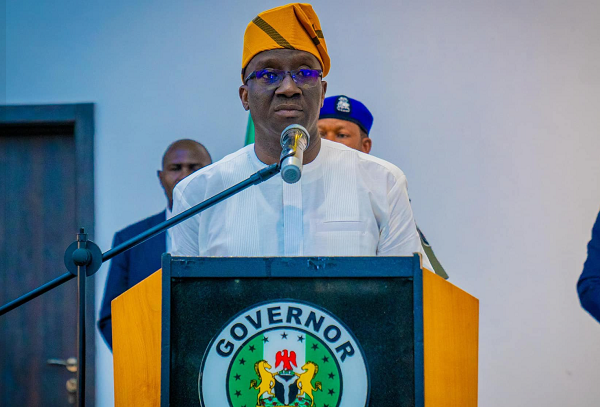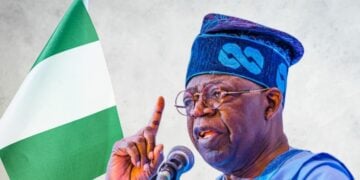The story of development in Nigeria is often written in the dust and mud of its roads. Highways are not just strips of asphalt; they are lifelines that connect farms to markets, towns to cities, and families to opportunity. When they fail, they do not simply inconvenience motorists.
They cut communities off, strangle economic activity, embolden criminals, and corrode public trust in governance. In Edo State, the decay of federal roads has for years symbolized this national malaise. Yet under Governor Monday Okpebholo, a new chapter is being written, one where leadership refuses to hide behind jurisdictional excuses and instead accepts that the welfare of citizens must come before the politics of federal and state boundaries.
For years, Edo people watched with frustration as critical highways deteriorated into craters and death traps. The previous administration under Godwin Obaseki adopted a stance that proved deeply unpopular: the position that federal roads should remain the federal government’s responsibility.
In principle, this might have seemed administratively correct, but in practice it was devastating. Roads are not used by “federal people” or “state people.” They are used by Nigerians, and in this case, overwhelmingly by the people of Edo State who bore the brunt of the neglect.
By refusing to intervene even with temporary measures, the past government left commuters stranded, traders counting losses, farmers unable to move produce, and families exposed to grave danger. The failures on these highways became not just a logistical nightmare but a metaphor for indifference, deepening the divide between citizens’ expectations and governmental response.
Governor Okpebholo has chosen a markedly different path. From his first months in office, he treated the condition of federal roads not as an abstract problem awaiting Abuja’s slow machinery, but as an urgent developmental and security challenge. His administration flagged off emergency palliative repairs on major failed sections in Edo North, simultaneously moving to intervene in other critical corridors that had effectively collapsed.
These actions are more than symbolic. They have restored mobility to areas where traffic once crawled or stopped entirely, brought relief to communities that had been cut off, and given traders and farmers renewed access to markets. By taking visible, immediate steps, the governor has sent a clear message: the state cannot afford to wait for distant bureaucracies while its people suffer.
The immediacy of these interventions is key to their effectiveness. Across Nigeria, citizens are accustomed to hearing long speeches about future projects that may never materialize. Okpebholo’s approach has been to act quickly with palliative works, grading, resurfacing, and controlling erosion, so that relief is felt within weeks, not years.
These fixes are not permanent, and he does not pretend that they are, but they serve an invaluable purpose. They buy time, reduce accidents, facilitate commerce, and restore a sense of normalcy. In a context where waiting for complete federal reconstruction can take a decade, such stopgap measures are not just practical, they are lifesaving.
Equally significant is the way the governor has framed road rehabilitation as a matter of public safety. Edo, like much of Nigeria, has struggled with insecurity along isolated and broken road corridors. Criminals exploit these failed highways to stage kidnappings and robberies, taking advantage of traffic jams and poor visibility.
By intervening in these areas, the government is not just fixing asphalt but reclaiming territory from criminal elements. A smooth, passable road is easier to patrol, harder for criminals to exploit, and safer for travelers. This linkage between infrastructure and security reframes the debate. It reminds the public that development and protection are intertwined, and that a government which repairs roads is also, in effect, fighting crime.
Another pillar of Okpebholo’s strategy has been his openness to partnerships and external financing. Infrastructure repair is expensive, and state resources are limited. Rather than hide behind this constraint, his administration has reached outward.
The recent investment summit in Glasgow, which attracted $250 million in diaspora and private investment commitments, reflects this openness. While the funds are targeted at multiple sectors including energy, agriculture, and industry, the willingness to attract and negotiate such commitments creates fiscal breathing space.
It signals that Edo is not waiting passively for federal allocations but is creatively expanding its revenue and investment base. This approach marks a clear departure from the more insular economic management of the past and demonstrates how international engagement can be tied back to local development needs.
Beyond finance, the culture of governance is also shifting. The Okpebholo administration has leaned into visibility and accountability. Publicly flagging off projects, setting timelines, and giving regular updates create benchmarks against which citizens can measure progress. This openness makes it harder for projects to vanish into procurement limbo and raises public expectations for continuity.
It also builds trust, which is perhaps the most intangible yet essential asset for any government. Citizens who believe their leaders are acting in their interest are more willing to endure temporary discomfort and more likely to support long-term development plans.
What makes this entire approach particularly instructive for other states is its pragmatism. Too often, federalism in Nigeria is invoked as a shield for inaction. Governors deflect responsibility by insisting that certain roads or facilities belong to the federal government.
While technically correct, such excuses leave citizens to wonder whether their suffering is lessened by the knowledge of jurisdiction.
Okpebholo’s decision to act anyway recognizes a fundamental truth: government is judged by outcomes, not excuses. The fact that the roads in question are labeled “federal” does not change the reality that they are used by the people of Edo, and it is their welfare that matters most. This lesson—that governance is ultimately about responsibility to people, not paperwork—should resonate across Nigeria.
Of course, caution is necessary. Emergency palliatives, no matter how welcome, are not substitutes for complete reconstruction and long-term maintenance. States that follow Edo’s example must ensure that patchwork does not become permanent policy. The ultimate goal must remain full rehabilitation and modernization, ideally in partnership with the federal government and private contractors.
Yet even here, Okpebholo’s model offers guidance. By demonstrating good faith through immediate interventions, states strengthen their case when lobbying Abuja for larger projects. They can point to the fact that they have already put their own skin in the game, thereby creating a moral and political claim for federal follow-up.
There is also the critical issue of transparency. For interventions to serve as models, procurement must be clean, contracts must deliver value for money, and timelines must be respected. Substandard works not only waste funds but also erode the very trust these interventions are meant to build.
Yet for all the caveats, the significance of Okpebholo’s interventions cannot be overstated. Roads are among the most visible and visceral symbols of governance. They touch every aspect of life—from how quickly food gets to the market, to whether children arrive at school on time, to whether patients can reach hospitals in emergencies.
They affect not just the economy but also the dignity of daily life. By stepping in where his predecessor chose to step aside, Okpebholo has not only rehabilitated stretches of tarmac but also restored a sense of care and connection between the government and the governed. He has demonstrated that leadership is not about pointing fingers at who should act, but about taking responsibility for those who must live with the consequences of inaction.
If other states follow this example, the transformation of Nigeria’s federal roads may begin not from Abuja but from the courage of governors willing to put their people first. It may begin with simple palliative works and culminate in sustained partnerships for full reconstruction.
What matters most is the willingness to act. In Edo, Governor Okpebholo has shown that willingness, and in doing so he has offered a model of governance that is pragmatic, responsive, and deeply human. That, more than any technical detail, is the lesson other states should take away: when leaders refuse to normalize bad roads, they do more than fix infrastructure—they restore hope, dignity, and the promise of progress.
*Itua, the Chief Press Secretary to Governor Monday Okpebholo of Edo State, writes from Benin.






